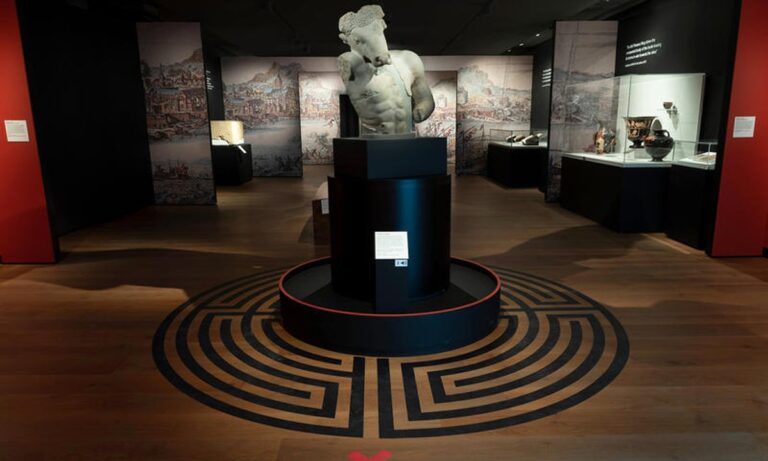As readers know, the British Museum is at the center of a theft scandal. First revealed last month, the scandal appears to have involved the removal of around 2,000 objects from the collection over a period of around a decade. Some details were confirmed this week by the museum, such as reported in The Art Newspaper.
Many are wondering what impact this scandal will have on ongoing discussions with Greece over the future of the Parthenon marbles. Those on both ends of the restitution debate have, of course, argued that the scandal furthers their cause: on the one hand, we hear that once and for all, undermines the old museum argument about being better placed to look after the assets of others; on the other, that the museum’s sole task should be to maintain its collection and that focusing on anything else is a distraction.
Dealing with the consequences of the thefts will become the museum’s unquestionable priority in the near future. Much time will now have to be spent identifying missing items, understanding how the thefts occurred, and recovering lost items. For the moment at least, public opinion will place less emphasis on finding a solution to the Marble problem. So let’s not expect a major announcement on this in the near future.
But the museum cannot afford to neglect this issue for long. When it comes to the Marbles, the status quo does not favor the British Museum, and a good faith attempt to resolve the dispute is now more necessary than ever. Many have argued that the reputation of the great museum has always suffered from its traditional stance on the marbles (and on restitution in general), and this is undoubtedly true. It would be impossible to count the number of times I have encountered colleagues and strangers from all corners of the world who have complained vehemently about the British Museum’s reactionary and intransigent stance on this issue. But the impact on the museum goes well beyond reputational damage.
Firstly, the refusal to engage in restitution proceedings can be considered as a ethical gap. The Icom (International Council of Museums) code of ethics, which the British Museum and all other serious museums in the world follow, is the best guarantee of ethics on this point. The Code specifically requires that museums promote the sharing of collections with countries of origin (section 6.1) and always remain ready to engage in feedback dialogues in an impartial manner (section 6.2). Museums should not shirk their ethical duties and should instead seek to comply with them as openly and honorably as possible.
Second, the continuing dispute night in the museum’s exhibition program. Due to the museum’s traditional stance on the marbles, the Greek Ministry of Culture has not authorized loans from Greek public museums to the British Museum. Due to this sad state of affairs, the British Museum avoids requesting loans of antiquities from Greek museums. This means that over the years, exhibitions of Greek art at the museum have lacked some of the world’s best specimens of classical sculpture, those pieces held by Greek institutions.
The loan embargo does not exist for any other British museum: only the British Museum. Consider the excellent exhibition which recently concluded at the Ashmolean Museum in Oxford entitled Labyrinth: Knossos, myth and reality, which included more than 100 objects on loan from Greek institutions, most of which had never been seen before by the British public. Such an exhibition would simply not have been possible at the British Museum, and that is regrettable.
Finally, there is a financial cost to the museum if the famous dispute is not resolved. As long as the issue remains controversial, it lends itself to political involvement, from both sides of the aisle, often from actors who may not have the institution’s best interests at heart. What is the collateral cost to the museum of British politicians taking a stand on the Marbles? This almost always gives politicians an easy way out, quickly avoiding being confronted with the real challenge plaguing the museum, namely the lack of public funding in the form of grants. It’s much easier for politicians to give a 30-second speech about the Marbles than to engage in the hard work necessary to win over the financial support the institution sorely needs. In fact, some financial deficits were exposed following the thefts.
The museum has done its best to address the ongoing issues around the Marbles and seek to challenge the status quo, which is a very good thing. But it cannot afford – at least not for long – to abandon what it has built with the Greek side over the past year: an apparently constructive dialogue aimed at resolving the world’s oldest conflict over cultural property.
When negotiations resume, there is no guarantee that a solution will be found (the problems are deep-rooted on both sides), but the parties must at least offer good faith attempts to break the impasse. Inaction would of course harm the Greeks, who consider the Marbles an integral part of their cultural heritage. It would also harm the museum-going public, who will never be able to see, for example, the story of the Parthenon frieze in one go, and several of the larger figures from the pediment reassembled, such as the goddess Athena whose shoulder is in London. and whose head is in Athens. And, as we have seen, the situation is also costing the British Museum dearly.
• Alexander Herman is the director of the Institute of Art and Law, based in the United Kingdom. His new book The Parthenon marble conflict: heritage, law, politicspublished by Hart / Bloomsbury as part of the Art Law Library, will be launched in London on September 28


